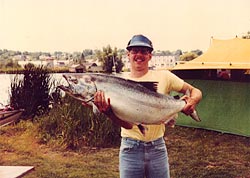|
"I don't consider my son a criminal at all. I feel that he has a
no-fault brain disease and I don't think for half a second he belongs
in a prison."
That succinctly sums up JoAnn Zwack's bitter opinion of her son's
62-year prison sentence.
Mrs. Zwack and her husband Joe still live in the house in suburban
St. Paul where they raised Kyle and another son. Joe is a retired
chemist who worked for 3M; JoAnn was a secretary. They're now active
in the National Alliance for the Mentally Ill. Watching Kyle grow
up, they say, they didn't see his disease coming.
 |
  |
 |
 |
 |
 |
 |
Kyle
Zwack on a fishing trip with his father in about 1982, shortly before the onset
of his mental illness. |
 |
  |
"He was a happy-go-lucky boy," says JoAnn. "I had never gotten
a call from a school teacher of any problem. He loved school. One
of the teachers said he was like a sponge absorbing knowledge."
"He liked outdoor things," Joe adds, recalling the fishing and
hunting trips the two took together.
The Zwacks say the changes in their son began when he was 21—an
engineering student at the University of Minnesota. He grew distant,
pacing in his room. Then came talk of suicide. Then bizarre rages.
One incident shocked the Zwacks into realizing they
were losing the son they'd known. A young woman whom Kyle was trying
to date wrote to the Zwacks saying Kyle was harrassing her.
"I thought the girl was lying because it didn't sound like my son,"
recalls JoAnn.
When JoAnn confronted Kyle with the letter, he demanded she hand
it over. She replied that he could have it after his father had
read it. Kyle stormed upstairs to his room and returned with a can
of mace that he carried in his part-time job as a security guard.
"And he sprayed me," JoAnn says, her voice breaking at the memory.
"And he went down to the police station and reported me for withholding
his federal mail."
Kyle's father, Joe, says when he came home later that day and JoAnn
described Kyle's behavior, he could scarcely believe it. "It was
so out of character for Kyle." To be aggressive and ... vengeful
almost, because of this letter."
From there, Kyle spiraled out of control. He was arrested for assaulting
the young woman he was obsessed with. Once released from jail, he
bought a gun and left town. He was arrested once more, in Wisconsin,
on a weapons charge. His parents tried to have him committed but
the court let him go, saying he hadn't proven he was dangerous.
For the next two years, Kyle roamed through the South, getting
and losing dozens of jobs, sometimes living in his car. He called
his parents occasionally but never told them his exact whereabouts.
Then came his sensational rushhour shoot-out with the Texas police.
JoAnn Zwack says when she heard the news, her horror was mixed
with relief: finally, she thought, Kyle would be found insane and
committed to a hospital. "I did not know that it's the norm...that
persons with severe mental illness go to prison."
Most Americans, like Mrs. Zwack, think it's common for criminal
defendants to gain acquittal through the insanity defense. It's
not.
Next:
The Hinckley Factor
|

